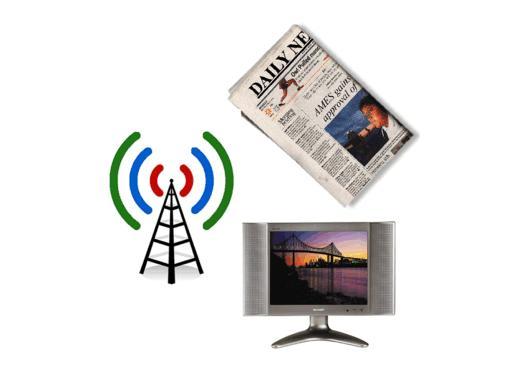Broadcast News Vs. Information: An Unfair Fight - Shelly Palmer Report

I have been thinking a lot lately about the future of newspapers and radio and television broadcast news; to put it another way, traditional media vs. new media. So, just for fun, I decided to see how my week would go if I didn't get any news from traditional media. Would I be better served or, would I miss it. I suggest you give it a try. No matter how well I craft the following paragraphs, I will not be able to help you emotionalize what I experienced. You must do it for yourself.
The Experiment
· Spend one week without newspaper, radio or television news.
The Hardware
· A PDA (I carry a BlackBerry Curve from Verizon)
· A WiFi equipped laptop, with wireless card (I used a MacBook Pro with a Verizon Wireless EVDO Rev A. Express Card)
The Software
· iGoogle (www.google/ig)
· Google Email Alerts
· Wall Street Journal Email Alerts
· New York Times Email Alerts
· Stock Quotes from Yahoo Finance via SMS and Email
· TweetLater.com Twitter Keyword Digests
· Google Reader with assorted RSS Feeds
· Google Calendar with weather overlay
· Google Sync for Mobile
· Sports Alerts from various sites
The Methodology
The first thing I did was to configure iGoogle to display all of the things I care about. Weather, sports scores, game times, movie info, highlights, news topics, and the blogs I follow. It took about an hour to get it perfect, but iGoogle is now a dynamic dashboard so customized to my news and information needs, I can't imagine why I would ever leave the screen.
Next I visited all of my favorite online news sources and set up email alerts based upon my specific requirements. As you know, I follow technology, media and entertainment in a rather disciplined way, so off I went to WSJ.com for tech alerts and NYT.com for their deal book, etc.
Next I set up SMS (text message) alerts for the things that I wanted to have instantly. Breaking news against my keywords, real-time sports scores, stock prices, etc.
Next I spent some quality time with Google alerts and TweetLater setting up key phrases for all of the companies I follow, all of the subjects that matter to me and every brand and product that I am truly interested in.
Next I subscribed to some video feeds on YouTube, Veoh and some other sites.
Finally, I spent time really weeding through my RSS feeds and culling them down to the ones that really matter. Feeds from trusted sources of news and opinion.
The Results
Having spent the better part of a day setting up my automated news gathering team you'd think I would have gotten it right. I didn't. I got it super-right! What I experienced (and continue to experience) is a remarkable world of instant contextual information programmed exactly as I need it. I get it in advance of my competitors (they could do this, but they haven't yet). I get it ahead of my ability to receive it from traditional news platforms. And, far more importantly, I get it WiwWiwWiw (What I want, Where I want, When I want).
Here's the crazy part. There's not that much advertising attached to it. Sure there are a few lines of text here and there. I do see "traditional" Internet display ads and an occasional video pre-roll, but it's far from over the top.
My Conclusions
Putting this together was about as difficult as programming the "favorites" on a television remote control. That is to say, "child's play." The hardest part was deciding what I really cared to know about on a regular basis. Not only did I "not" miss my traditional media news, I was thrilled to live in an almost commercial-free, hype-free, sensationalist-free world. Sure there were conflicting political points of view, but I got both sides in a fair and balanced way because that's how I set it up./p>
Having spent the time setting up my automated news team, I don't think I'll ever go back to traditional media for my daily news. Of course, I'm interested in what some of the true experts have to say about things that are happening. But they all have a presence online and, in many ways, they are more accessible and more interesting when they are unabridged.
When Google, Yahoo! or someone else makes this exercise in personal news aggregation just a little easier, it is going to become extremely difficult for traditional news organizations to maintain any kind of educated audience at scale. If I were a traditional news outlet (print or broadcast) I'd be spending my time and my money investing in creating "iTunes for News." It seems like the only logical path to the future.
Shelly Palmer is the host of MediaBytes with Shelly Palmer, a daily show featuring news you can use about technology, media & entertainment. He is the author of Television Disrupted: The Transition from Network to Networked TV (2008, New York House Press) and the upcoming, Get Digital: Reinventing Yourself and Your Career for the 21st Century Economy. (2009, Lake House Press). Shelly is also President of the National Academy of Television Arts & Sciences, NY (the organization that bestows the coveted Emmy Awards). For information about Get Digital Classes, visit http://www.shellypalmer.com/seminars


